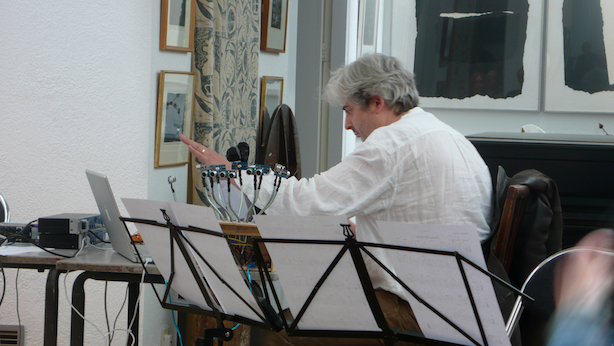rhoadley.net music research software blogs
vimeo youtube gallery
five pieces sextet through the sharp hawthorn only connect in principio miscellaneous concertino three pieces for two pianos four archetypes petrochemicals copenhagen ambience hello histrionica telephony many worlds 127 haiku 128 haiku triggered touching sound 127 messages
calder's violin fluxus fluxus tree player piano three streams quantum canticorum december variations december mobile semaphore piano glyphs how to play the piano choreograms edge violations homage unthinking not songs graffiti
devices: gaggle gagglina wired threads glyphs metapiano digiphone
NB All material on this site is © Richard Hoadley (and others), 1980-2023
One Hundred and Twenty-Seven Haiku
Automatic music for computer
May, 2009
About the piece
Constructed using SuperCollider, One Hundred and Twenty-seven Haiku is a development of pSY and its products The Copenhagen Interpretation (1998-1999) and Ambience (2002) and the more recent Many Worlds (2008). The former used custom made software made with Visual Basic to control Yamaha SY synthesisers. The latter used SuperCollider to control similar TG77 synths. One Hundred and Twenty-Seven Haiku uses SuperCollider to do everything: design and generate the sounds as well as decide when to play them and what they should play.

128 Haiku Photo courtesy of Tim Regan
Performances and Publications
Performances (2008) Many Worlds Semi-automatic music for Yamaha TG synthesiser and computers Kettles Yard, Cambridge, 11th May info: http://rhoadley.net/comp/manyworlds.php audio: http://rhoadley.org/sounds/manyworlds/ManyWorlds05n.mp3 (2009) One Hundred and Twenty-Seven Haiku Automatic performance/composition with custom software Kettles Yard, Cambridge, 10th May info: http://rhoadley.net/comp/haiku/index.php audio: http://rhoadley.net/sounds/127/127Haiku_128k_090507_101239.mp3 (2010) One Hundred and Twenty-Eight Haiku Automatic performance/composition with custom hardware and software. Kettles Yard, Cambridge, 9th May info: http://rhoadley.net/comp/128haiku/index.php audio: http://rhoadley.net/sounds/128/128HaikuLive.m4a (2011) One Hundred and Twenty-Seven Messages Crowdsourced composition and performance controlled by mobile devices. Presented at 'Sounds Like Mobility' Conference, Cambridge, 17th May Commissioned through 'Enterprising Academics' scholarship http://rhoadley.net/comp/messages/index.php Publications (2011) A principled approach to developing new languages for live coding Samuel Aaron, Alan F. Blackwell, Richard Hoadley and Tim Regan, Proceedings of NIME (New Interfaces for Musical Expression), Oslo (ISBN: 978-82-991841-7-5) http://www.nime2011.org/proceedings/papers/K04-Aaron.pdf Papers (2011) Analysis of algorithmic music generated through physical embodiment Seventh International Conference on Music Since 1900/International Conference of the Society for Music Analysis, University of Lancaster, July http://rhoadley.net/research/abstracts/analysis_algorithms_richard_hoadley.pdf (2010) Towards embodied control of algorithmic music Music and Numbers, Canterbury Christ Church University, 14 - 15 May (Abstract published in ISBN 978-1-899253-76-0)
One Hundred and Twenty-seven Haiku by rhoadley
|
Refresh the page for a new haiku |
- Audio (128K mp3, 11MB)
- First performance programme at Kettle's Yard
- Haiku Generator
- Other Compositions
- Other Research
Haiku Generator
The Generator was originally designed and copyrighted by AHA! Software Inc., Victoria, BC, Canada and can be found here.
One plan is to display the haikus while the piece is being performed, ad libitum. It's possible that I'll try to find a way for the haikus to actually influence the performance of the piece.